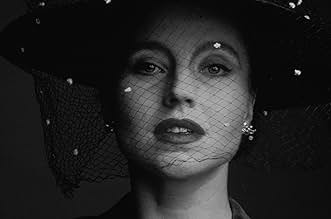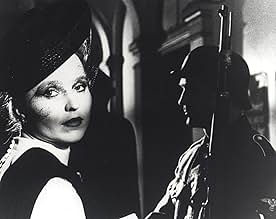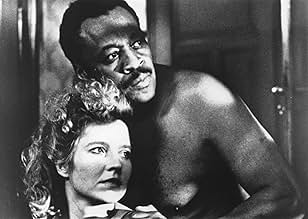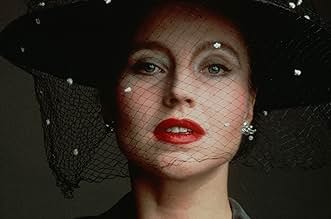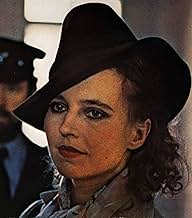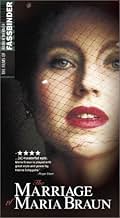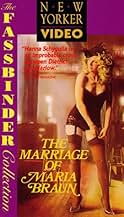IMDb-BEWERTUNG
7,7/10
15.770
IHRE BEWERTUNG
Eine Witwe aus dem Zweiten Weltkrieg versucht, sich an das Leben im Nachkriegsdeutschland anzupassen.Eine Witwe aus dem Zweiten Weltkrieg versucht, sich an das Leben im Nachkriegsdeutschland anzupassen.Eine Witwe aus dem Zweiten Weltkrieg versucht, sich an das Leben im Nachkriegsdeutschland anzupassen.
- Auszeichnungen
- 13 Gewinne & 7 Nominierungen insgesamt
George Eagles
- Bill
- (as George Byrd)
Günter Lamprecht
- Hans Wetzel
- (as Günther Lamprecht)
Empfohlene Bewertungen
There is a strong resemblance of 'Maria Braun' to Curtiz' noirish 'Mildred Pierce'. While Mildred rebuilds her life after a personal tragedy, so does Maria, albeit in the backdrop of the post-war German economic disaster. Just as Mildred's loyalty was to her daughter, for Maria it was her husband Hermann (her man?). The two make sacrifices for each other hoping to build a better life for themselves. The major difference is that Maria's husband is a much more sympathetic character than Mildred's daughter, which robs the movie of some tension. Of course since Maria herself is not a very likeable person, one doesn't feel too much for her.
The story in a nutshell is of almost war widow Maria Braun rebuilding her life in post war Germany & rising high on the corporate ladder till she realises that she has given too much of herself for the climb to enjoy the cause she was climbing for.
Standing by itself, I still think this movie will appeal either to European baby boomers or serious students of Fasbinder. The narrative is straight forward & the final TV audio track is a brilliant touch. Hanna Schygulla as Maria gives yet another great performance for Fasbinder.
The story in a nutshell is of almost war widow Maria Braun rebuilding her life in post war Germany & rising high on the corporate ladder till she realises that she has given too much of herself for the climb to enjoy the cause she was climbing for.
Standing by itself, I still think this movie will appeal either to European baby boomers or serious students of Fasbinder. The narrative is straight forward & the final TV audio track is a brilliant touch. Hanna Schygulla as Maria gives yet another great performance for Fasbinder.
Maria Braun's marriage is a very successful metaphor for post-war Germany, for the economic miracle played by Adenauer, himself heard several times in the film, in his speeches appealing to pride in German economic reconstruction.
In the rubble of the Second World War, Maria/Germany survives, between a tenuous hope of returning to the lost past and the agony of a miserable and dishonorable present.
But the defeated have no right to shame. It is up to them to rebuild the future in the bed of the victors, until they learn to live without them, more than autonomously, as new victorious powers, taking the place of those who humiliated them. In life, in the economy or even in football (Fassbinder coincides the narrative climax with the 1952 World Cup final, in which Germany became champion, for the first time in the history of the competition, thus using yet another metaphor for German reconstruction).
After the victory is complete, the honor is washed away, life ends and it is time to give way to others, to the future, which must not repeat the mistakes of the past.
A bold message and a powerful performance by Hanna Schygullla.
Fassbinder at his best.
In the rubble of the Second World War, Maria/Germany survives, between a tenuous hope of returning to the lost past and the agony of a miserable and dishonorable present.
But the defeated have no right to shame. It is up to them to rebuild the future in the bed of the victors, until they learn to live without them, more than autonomously, as new victorious powers, taking the place of those who humiliated them. In life, in the economy or even in football (Fassbinder coincides the narrative climax with the 1952 World Cup final, in which Germany became champion, for the first time in the history of the competition, thus using yet another metaphor for German reconstruction).
After the victory is complete, the honor is washed away, life ends and it is time to give way to others, to the future, which must not repeat the mistakes of the past.
A bold message and a powerful performance by Hanna Schygullla.
Fassbinder at his best.
Maria Braun got married right in the middle of combat all around her and her husband Hermann. An explosion ripped through the building, to begin with, and she and Hermann had to sign the papers on a pile of rubble on the street. Perhaps this may strike some as a heavy-handed metaphor for what's about to come: marriage on the rocks, so to speak. It's a betrothal where the husband goes off to war and is held in a Russian prison camp, unbenownst to the helpless but hopeful and proud Maria, who keeps standing by the depressing rubble of the train station as some come home, others don't, with a sign awaiting Hermann.
Trouble arises, as happens in Rainer Werner Fassbinder's melodramas, and as its one of his best and most provocative, we see as Maria (uncommonly gorgeous Hanna Schygulla in this role) will do a two-face: she'll stand by her man, even if it means working at a bar for American GI's and, even still after she hears from a fellow soldier that Hermann has died will still stand by him as she sleeps with a black GI and comes close to bearing his child (that is, naturally, until he reappears and a murder occurs and he takes the rap so she can be safe), or working for a German businessman (effectively sympathetic Ivan Desny) and becoming his sometimes mistress and rising star in the company. Maria will do whatever it takes to be successful, but she'll always be married.
It's hard to say there's anything about Maria that isn't fascinating. Money, sex, power, all of these become interchangeable for Maria. She's like the feminist that has her cake and eats it with a sultry smile: she gets to have a husband, more or less (actually a lot less until the last ten minutes of the film) while obtaining things- a man who dotes on her whenever he can, a new and expensive house with servants, a secretary, money- that others around her aren't getting due to already being with a man or too weak in a position to rise anywhere (such as the secretary, played interestingly enough by Fassbinder's own mother).
Maria is sexy, confident, and all alone, with an idealized life going against a life that should be made in the shade. She says of the two men- the American soldier and poor old and sick Oswald- that she's fond of them, and at the same time will stick by those roses the confused and soul-searching husband Hermann sends from Canada, after being released from prison. She's casts a profile that a feminist would love to trounce, but understand where she's coming from and going all the way.
Fassbinder employs this inherent contradiction, and moments with Maria appear to go against the conventions of a melodrama (for example, Hermann walking in on the jubilant and half-naked Maria and GI is just about a masterpiece of a scene, with Maria's reaction not of surprise or guilt but pure happiness to see that he's there let alone alive), while sticking to his guns as a director of such high-minded technique with a storyline that should be predictable. But it isn't really. It's like one big metaphor for a country that, after the war, couldn't really move on to normalcy. A few times Fassbinder puts sound of the radio on in the background, and we see Maria walking around her family house, hustle and bustle going on around her, and the radio speaks of a divided Germany, of things still very unsettled, of a disarray. Maybe the only way to cope is excess, or maybe that's just my interpretation of it.
It's hard to tell, really, under Schygulla's stare face and eyes, anyway. It's such an incredible performance, really, one of those showstoppers that captures the glamor and allure of an old-time Hollywood female star while with the down-and-dirty ethic of a girl of the streets. Most telling are the opposing costumes one sees in one scene when she finally is with her husband, where she stars in one of those super-lustful black lingerie pieces and high heels, and then moves on to a dress without even thinking about it. That's almost the essence of what Maria is, and Schygulla wonderfully gets it down, a headstrong but somehow loving figure who is adored and perplexed by the men around her, sometimes in a single sentence. This is what Fassbinder captures in his wonderful first part of his "trilogy"; while I might overall prefer Veronika Voss as a masterpiece, Maria Braun is perhaps just as good as a character study, of what makes a woman tick and tock with (almost) nothing to lose.
Trouble arises, as happens in Rainer Werner Fassbinder's melodramas, and as its one of his best and most provocative, we see as Maria (uncommonly gorgeous Hanna Schygulla in this role) will do a two-face: she'll stand by her man, even if it means working at a bar for American GI's and, even still after she hears from a fellow soldier that Hermann has died will still stand by him as she sleeps with a black GI and comes close to bearing his child (that is, naturally, until he reappears and a murder occurs and he takes the rap so she can be safe), or working for a German businessman (effectively sympathetic Ivan Desny) and becoming his sometimes mistress and rising star in the company. Maria will do whatever it takes to be successful, but she'll always be married.
It's hard to say there's anything about Maria that isn't fascinating. Money, sex, power, all of these become interchangeable for Maria. She's like the feminist that has her cake and eats it with a sultry smile: she gets to have a husband, more or less (actually a lot less until the last ten minutes of the film) while obtaining things- a man who dotes on her whenever he can, a new and expensive house with servants, a secretary, money- that others around her aren't getting due to already being with a man or too weak in a position to rise anywhere (such as the secretary, played interestingly enough by Fassbinder's own mother).
Maria is sexy, confident, and all alone, with an idealized life going against a life that should be made in the shade. She says of the two men- the American soldier and poor old and sick Oswald- that she's fond of them, and at the same time will stick by those roses the confused and soul-searching husband Hermann sends from Canada, after being released from prison. She's casts a profile that a feminist would love to trounce, but understand where she's coming from and going all the way.
Fassbinder employs this inherent contradiction, and moments with Maria appear to go against the conventions of a melodrama (for example, Hermann walking in on the jubilant and half-naked Maria and GI is just about a masterpiece of a scene, with Maria's reaction not of surprise or guilt but pure happiness to see that he's there let alone alive), while sticking to his guns as a director of such high-minded technique with a storyline that should be predictable. But it isn't really. It's like one big metaphor for a country that, after the war, couldn't really move on to normalcy. A few times Fassbinder puts sound of the radio on in the background, and we see Maria walking around her family house, hustle and bustle going on around her, and the radio speaks of a divided Germany, of things still very unsettled, of a disarray. Maybe the only way to cope is excess, or maybe that's just my interpretation of it.
It's hard to tell, really, under Schygulla's stare face and eyes, anyway. It's such an incredible performance, really, one of those showstoppers that captures the glamor and allure of an old-time Hollywood female star while with the down-and-dirty ethic of a girl of the streets. Most telling are the opposing costumes one sees in one scene when she finally is with her husband, where she stars in one of those super-lustful black lingerie pieces and high heels, and then moves on to a dress without even thinking about it. That's almost the essence of what Maria is, and Schygulla wonderfully gets it down, a headstrong but somehow loving figure who is adored and perplexed by the men around her, sometimes in a single sentence. This is what Fassbinder captures in his wonderful first part of his "trilogy"; while I might overall prefer Veronika Voss as a masterpiece, Maria Braun is perhaps just as good as a character study, of what makes a woman tick and tock with (almost) nothing to lose.
Allegory for postwar Germany...examination of modernist female sexuality...Marxist critique of human labor under capitalism...yada, yada. I won't bore you with that prattle. Which isn't to say those idea weren't baked into the movie or that you're wrong to see the movie as deeply philosophical. But it certainly isn't necessary to enjoying the movie.
The Marriage of Maria Braun is a great film without needing to be dissected as some dull academic thesis paper. Maria depicted quite spectacularly by Hanna Schygulla, she plays a character who I can't really decide is tragic or the real "villain." This is one of those weird films where every character is so endearing and well written that it's painful to see things go so off the rails for them.
Ending was a little obvious, and I could argue it was too dumb for the rest of the movie, but overall an amazing production.
The Marriage of Maria Braun is a great film without needing to be dissected as some dull academic thesis paper. Maria depicted quite spectacularly by Hanna Schygulla, she plays a character who I can't really decide is tragic or the real "villain." This is one of those weird films where every character is so endearing and well written that it's painful to see things go so off the rails for them.
Ending was a little obvious, and I could argue it was too dumb for the rest of the movie, but overall an amazing production.
Having heard of this film for years, I didn't see it until 2003! Perhaps it's just as well that I waited. It is one of the finest films of its type -- post WW2 in Germany -- that I've ever seen; perhaps on balance the finest.
It seems to me that rather than being a cynical portrayal of those difficult years, it is more truthful and revelatory in a deep way. I imagine that no one other than those who lived then can begin to tell the story, which is why Fassbinder has tried on our behalf -- to try to convey to us the angst, the frustrations, the sadness, the insanity, the querulousness, the fragile hope of that era.
I find the story very sad, of course, because in my early-21st century psyche I'm more tuned into the love story than I am the tale of the sociology and social psychology of an era that occurred when I was very young. It seems to me that if one views the characters as representatives of some of the major "world views" obtaining during the reconstruction period, one sees a few of the many different human reactions there can be to such an experience: Many feel burned out and can't feel hope any longer; others, like Maria, feel there is at least money and position to be gained under the new dispensation; some simply don't care; others try to feed off the experience without contributing; and so on and so forth.
It also occurred to me that, at age 60, I may be in a position to appreciate this film more, and certainly to be more understanding of and sympathetic with the characters/types portrayed. I found each of them to have an important story to tell, whether it was a "good" story or not. And the character of the Black US Army Sergeant, while tragic at the end, was itself an essay in human relations that has to embarrass most Americans -- the fleeting moments when he and Maria found joy and pleasant times together were just wonderful to behold, and an indictment of our sad history in that regard.
View it and see what you think!
It seems to me that rather than being a cynical portrayal of those difficult years, it is more truthful and revelatory in a deep way. I imagine that no one other than those who lived then can begin to tell the story, which is why Fassbinder has tried on our behalf -- to try to convey to us the angst, the frustrations, the sadness, the insanity, the querulousness, the fragile hope of that era.
I find the story very sad, of course, because in my early-21st century psyche I'm more tuned into the love story than I am the tale of the sociology and social psychology of an era that occurred when I was very young. It seems to me that if one views the characters as representatives of some of the major "world views" obtaining during the reconstruction period, one sees a few of the many different human reactions there can be to such an experience: Many feel burned out and can't feel hope any longer; others, like Maria, feel there is at least money and position to be gained under the new dispensation; some simply don't care; others try to feed off the experience without contributing; and so on and so forth.
It also occurred to me that, at age 60, I may be in a position to appreciate this film more, and certainly to be more understanding of and sympathetic with the characters/types portrayed. I found each of them to have an important story to tell, whether it was a "good" story or not. And the character of the Black US Army Sergeant, while tragic at the end, was itself an essay in human relations that has to embarrass most Americans -- the fleeting moments when he and Maria found joy and pleasant times together were just wonderful to behold, and an indictment of our sad history in that regard.
View it and see what you think!
Wusstest du schon
- WissenswertesInspired by "Mutter Courage und ihre Kinder" (1938/39), a play by Bertolt Brecht, and Baby Face (1933).
- PatzerAt the end of the cut of the two kids blowing up the firecrackers, they start laughing but no sound is heard. The sound of laughter is heard on the next cut after they get yelled at by the man scavenging for wood.
- Zitate
Maria Braun: I'm a master of deceit: a capitalist tool by day, and by night an agent of the proletarian masses - the Mata Hari of the Economic Miracle.
- Crazy CreditsAt the very end of the credits the following persons are 'credited' by their picture: Konrad Adenauer, Ludwig Erhard, Kurt Georg Kiesinger and Helmut Schmidt and a disconnected phone line can be heard.
- SoundtracksIn The Mood
Written by Wingy Manone, Andy Razaf and Joe Garland
Top-Auswahl
Melde dich zum Bewerten an und greife auf die Watchlist für personalisierte Empfehlungen zu.
- How long is The Marriage of Maria Braun?Powered by Alexa
Details
- Erscheinungsdatum
- Herkunftsland
- Offizielle Standorte
- Sprachen
- Auch bekannt als
- The Marriage of Maria Braun
- Drehorte
- Produktionsfirmen
- Weitere beteiligte Unternehmen bei IMDbPro anzeigen
Box Office
- Budget
- 1.975.000 DM (geschätzt)
- Bruttoertrag in den USA und Kanada
- 8.144 $
- Eröffnungswochenende in den USA und in Kanada
- 11.623 $
- 16. Feb. 2003
- Weltweiter Bruttoertrag
- 11.869 $
Zu dieser Seite beitragen
Bearbeitung vorschlagen oder fehlenden Inhalt hinzufügen

Oberste Lücke
By what name was Die Ehe der Maria Braun (1979) officially released in India in English?
Antwort

